Auditing and Assurance: Internal Controls and External Auditor Roles
VerifiedAdded on 2019/10/09
|6
|1345
|256
Report
AI Summary
This report delves into the critical roles of internal controls and external auditors within the realm of auditing and assurance. It begins by emphasizing the significance of internal controls, particularly for risk management and fraud prevention, especially highlighting their importance for small businesses. The report then examines the responsibilities of internal controllers, including transaction verification, fraud risk assessment, and ensuring compliance with accounting standards. The second part of the report focuses on external auditors, detailing their functions in analyzing financial statements, providing assurance, and adhering to legal frameworks like the Company Act. The role of external auditors in detecting fraud and their liability to third parties are also discussed, underscoring their vital contribution to the reliability of financial reporting. References to key literature are included to support the analysis.
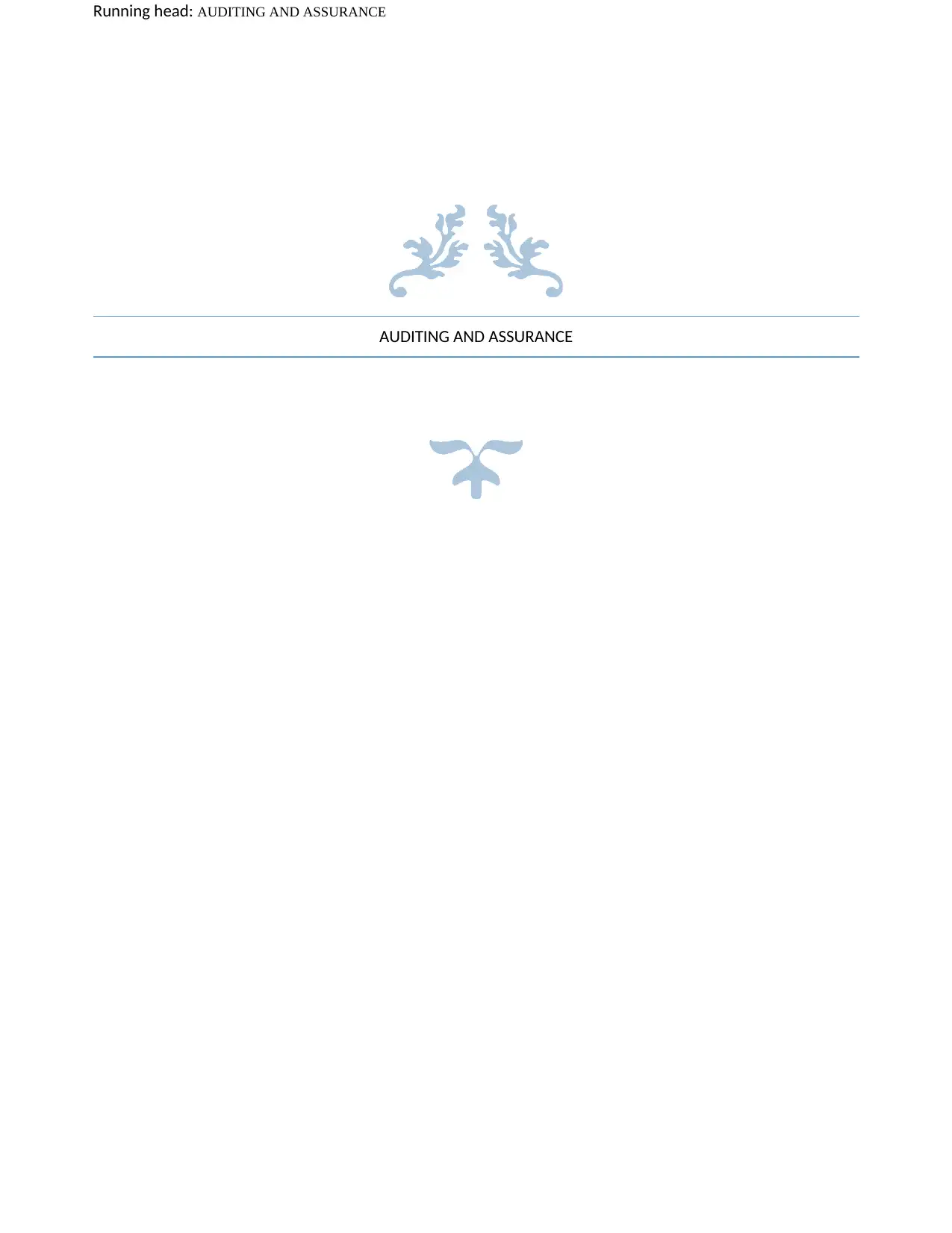
Running head: AUDITING AND ASSURANCE
AUDITING AND ASSURANCE
AUDITING AND ASSURANCE
Paraphrase This Document
Need a fresh take? Get an instant paraphrase of this document with our AI Paraphraser
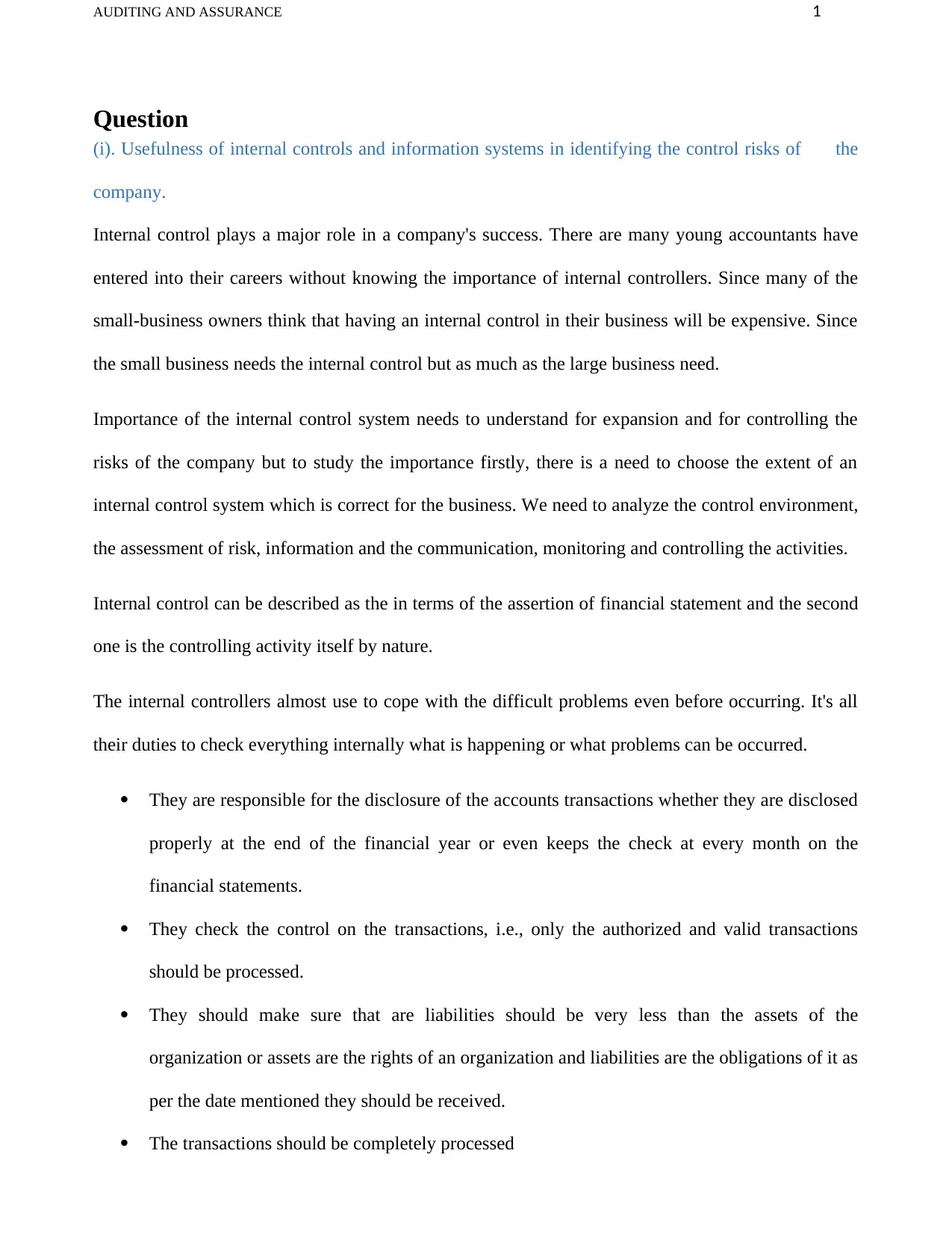
AUDITING AND ASSURANCE 1
Question
(i). Usefulness of internal controls and information systems in identifying the control risks of the
company.
Internal control plays a major role in a company's success. There are many young accountants have
entered into their careers without knowing the importance of internal controllers. Since many of the
small-business owners think that having an internal control in their business will be expensive. Since
the small business needs the internal control but as much as the large business need.
Importance of the internal control system needs to understand for expansion and for controlling the
risks of the company but to study the importance firstly, there is a need to choose the extent of an
internal control system which is correct for the business. We need to analyze the control environment,
the assessment of risk, information and the communication, monitoring and controlling the activities.
Internal control can be described as the in terms of the assertion of financial statement and the second
one is the controlling activity itself by nature.
The internal controllers almost use to cope with the difficult problems even before occurring. It's all
their duties to check everything internally what is happening or what problems can be occurred.
They are responsible for the disclosure of the accounts transactions whether they are disclosed
properly at the end of the financial year or even keeps the check at every month on the
financial statements.
They check the control on the transactions, i.e., only the authorized and valid transactions
should be processed.
They should make sure that are liabilities should be very less than the assets of the
organization or assets are the rights of an organization and liabilities are the obligations of it as
per the date mentioned they should be received.
The transactions should be completely processed
Question
(i). Usefulness of internal controls and information systems in identifying the control risks of the
company.
Internal control plays a major role in a company's success. There are many young accountants have
entered into their careers without knowing the importance of internal controllers. Since many of the
small-business owners think that having an internal control in their business will be expensive. Since
the small business needs the internal control but as much as the large business need.
Importance of the internal control system needs to understand for expansion and for controlling the
risks of the company but to study the importance firstly, there is a need to choose the extent of an
internal control system which is correct for the business. We need to analyze the control environment,
the assessment of risk, information and the communication, monitoring and controlling the activities.
Internal control can be described as the in terms of the assertion of financial statement and the second
one is the controlling activity itself by nature.
The internal controllers almost use to cope with the difficult problems even before occurring. It's all
their duties to check everything internally what is happening or what problems can be occurred.
They are responsible for the disclosure of the accounts transactions whether they are disclosed
properly at the end of the financial year or even keeps the check at every month on the
financial statements.
They check the control on the transactions, i.e., only the authorized and valid transactions
should be processed.
They should make sure that are liabilities should be very less than the assets of the
organization or assets are the rights of an organization and liabilities are the obligations of it as
per the date mentioned they should be received.
The transactions should be completely processed
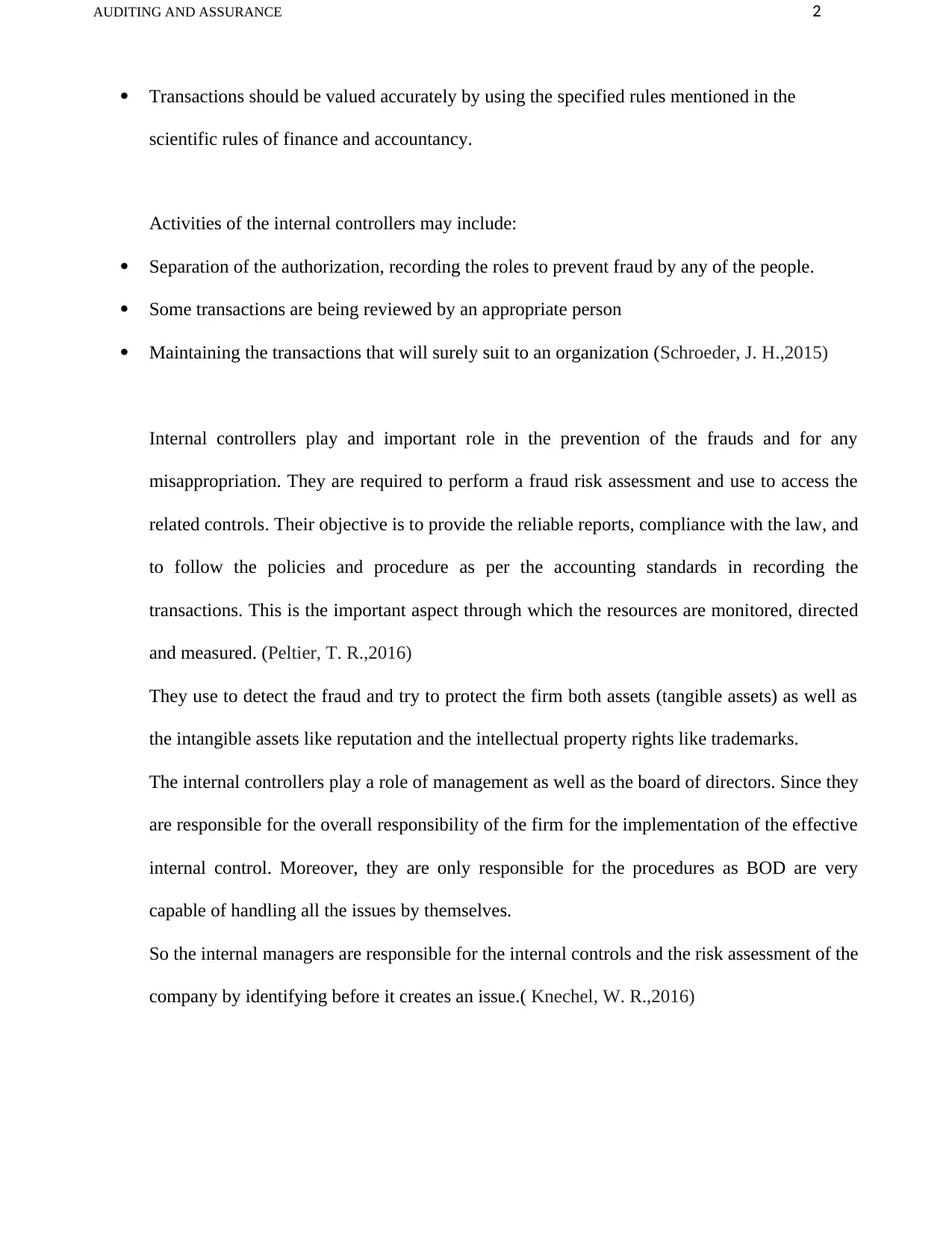
AUDITING AND ASSURANCE 2
Transactions should be valued accurately by using the specified rules mentioned in the
scientific rules of finance and accountancy.
Activities of the internal controllers may include:
Separation of the authorization, recording the roles to prevent fraud by any of the people.
Some transactions are being reviewed by an appropriate person
Maintaining the transactions that will surely suit to an organization (Schroeder, J. H.,2015)
Internal controllers play and important role in the prevention of the frauds and for any
misappropriation. They are required to perform a fraud risk assessment and use to access the
related controls. Their objective is to provide the reliable reports, compliance with the law, and
to follow the policies and procedure as per the accounting standards in recording the
transactions. This is the important aspect through which the resources are monitored, directed
and measured. (Peltier, T. R.,2016)
They use to detect the fraud and try to protect the firm both assets (tangible assets) as well as
the intangible assets like reputation and the intellectual property rights like trademarks.
The internal controllers play a role of management as well as the board of directors. Since they
are responsible for the overall responsibility of the firm for the implementation of the effective
internal control. Moreover, they are only responsible for the procedures as BOD are very
capable of handling all the issues by themselves.
So the internal managers are responsible for the internal controls and the risk assessment of the
company by identifying before it creates an issue.( Knechel, W. R.,2016)
Transactions should be valued accurately by using the specified rules mentioned in the
scientific rules of finance and accountancy.
Activities of the internal controllers may include:
Separation of the authorization, recording the roles to prevent fraud by any of the people.
Some transactions are being reviewed by an appropriate person
Maintaining the transactions that will surely suit to an organization (Schroeder, J. H.,2015)
Internal controllers play and important role in the prevention of the frauds and for any
misappropriation. They are required to perform a fraud risk assessment and use to access the
related controls. Their objective is to provide the reliable reports, compliance with the law, and
to follow the policies and procedure as per the accounting standards in recording the
transactions. This is the important aspect through which the resources are monitored, directed
and measured. (Peltier, T. R.,2016)
They use to detect the fraud and try to protect the firm both assets (tangible assets) as well as
the intangible assets like reputation and the intellectual property rights like trademarks.
The internal controllers play a role of management as well as the board of directors. Since they
are responsible for the overall responsibility of the firm for the implementation of the effective
internal control. Moreover, they are only responsible for the procedures as BOD are very
capable of handling all the issues by themselves.
So the internal managers are responsible for the internal controls and the risk assessment of the
company by identifying before it creates an issue.( Knechel, W. R.,2016)
⊘ This is a preview!⊘
Do you want full access?
Subscribe today to unlock all pages.

Trusted by 1+ million students worldwide
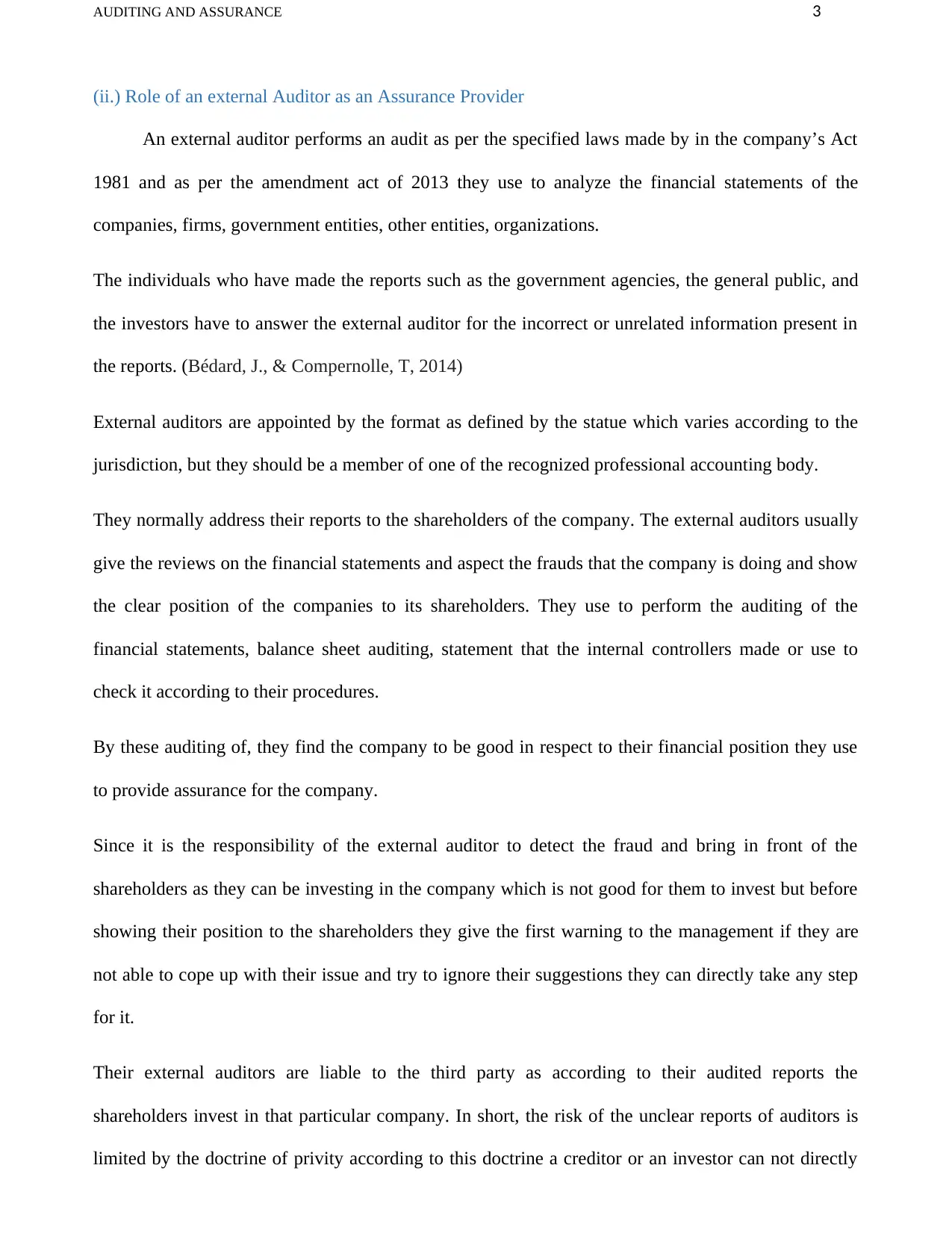
AUDITING AND ASSURANCE 3
(ii.) Role of an external Auditor as an Assurance Provider
An external auditor performs an audit as per the specified laws made by in the company’s Act
1981 and as per the amendment act of 2013 they use to analyze the financial statements of the
companies, firms, government entities, other entities, organizations.
The individuals who have made the reports such as the government agencies, the general public, and
the investors have to answer the external auditor for the incorrect or unrelated information present in
the reports. (Bédard, J., & Compernolle, T, 2014)
External auditors are appointed by the format as defined by the statue which varies according to the
jurisdiction, but they should be a member of one of the recognized professional accounting body.
They normally address their reports to the shareholders of the company. The external auditors usually
give the reviews on the financial statements and aspect the frauds that the company is doing and show
the clear position of the companies to its shareholders. They use to perform the auditing of the
financial statements, balance sheet auditing, statement that the internal controllers made or use to
check it according to their procedures.
By these auditing of, they find the company to be good in respect to their financial position they use
to provide assurance for the company.
Since it is the responsibility of the external auditor to detect the fraud and bring in front of the
shareholders as they can be investing in the company which is not good for them to invest but before
showing their position to the shareholders they give the first warning to the management if they are
not able to cope up with their issue and try to ignore their suggestions they can directly take any step
for it.
Their external auditors are liable to the third party as according to their audited reports the
shareholders invest in that particular company. In short, the risk of the unclear reports of auditors is
limited by the doctrine of privity according to this doctrine a creditor or an investor can not directly
(ii.) Role of an external Auditor as an Assurance Provider
An external auditor performs an audit as per the specified laws made by in the company’s Act
1981 and as per the amendment act of 2013 they use to analyze the financial statements of the
companies, firms, government entities, other entities, organizations.
The individuals who have made the reports such as the government agencies, the general public, and
the investors have to answer the external auditor for the incorrect or unrelated information present in
the reports. (Bédard, J., & Compernolle, T, 2014)
External auditors are appointed by the format as defined by the statue which varies according to the
jurisdiction, but they should be a member of one of the recognized professional accounting body.
They normally address their reports to the shareholders of the company. The external auditors usually
give the reviews on the financial statements and aspect the frauds that the company is doing and show
the clear position of the companies to its shareholders. They use to perform the auditing of the
financial statements, balance sheet auditing, statement that the internal controllers made or use to
check it according to their procedures.
By these auditing of, they find the company to be good in respect to their financial position they use
to provide assurance for the company.
Since it is the responsibility of the external auditor to detect the fraud and bring in front of the
shareholders as they can be investing in the company which is not good for them to invest but before
showing their position to the shareholders they give the first warning to the management if they are
not able to cope up with their issue and try to ignore their suggestions they can directly take any step
for it.
Their external auditors are liable to the third party as according to their audited reports the
shareholders invest in that particular company. In short, the risk of the unclear reports of auditors is
limited by the doctrine of privity according to this doctrine a creditor or an investor can not directly
Paraphrase This Document
Need a fresh take? Get an instant paraphrase of this document with our AI Paraphraser
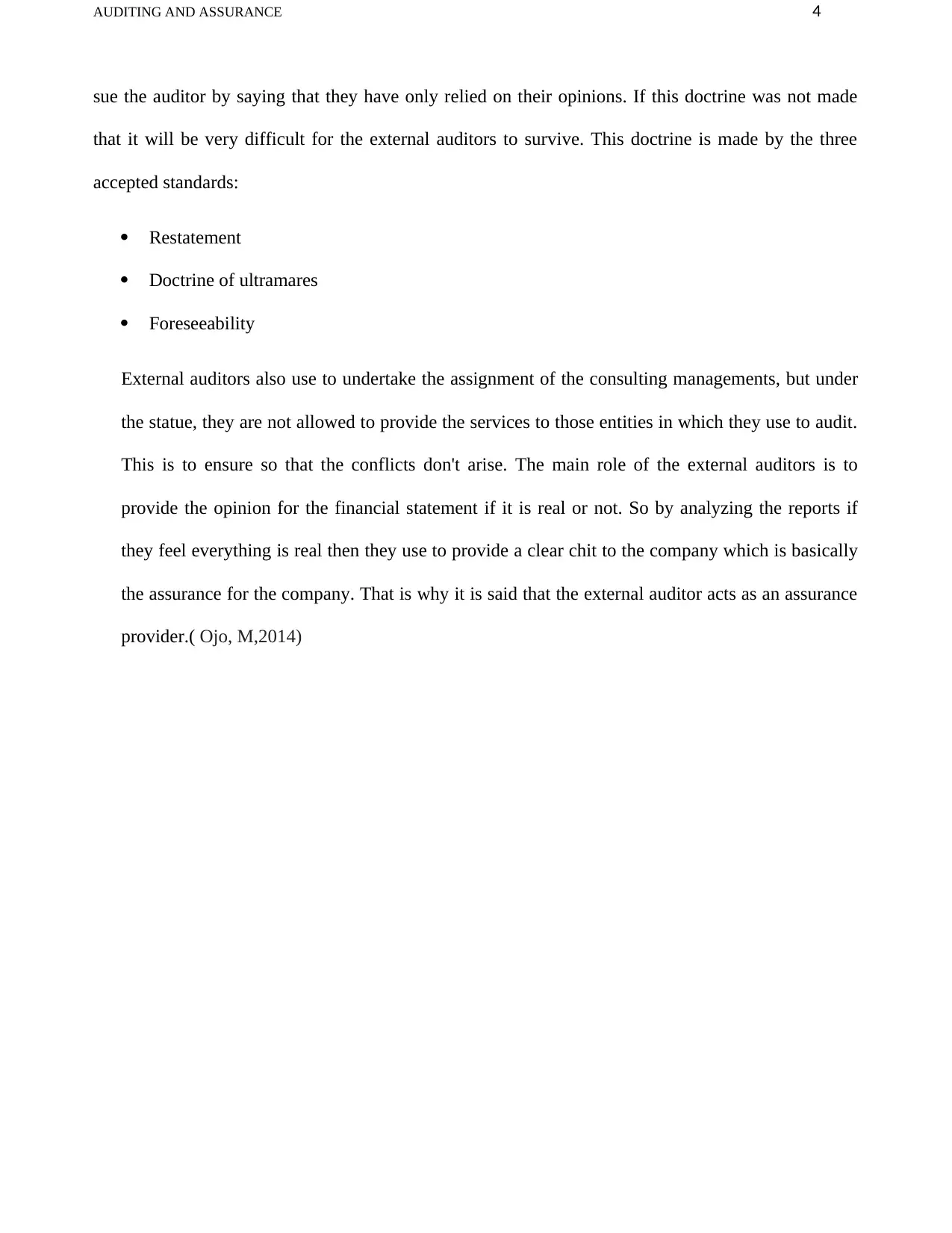
AUDITING AND ASSURANCE 4
sue the auditor by saying that they have only relied on their opinions. If this doctrine was not made
that it will be very difficult for the external auditors to survive. This doctrine is made by the three
accepted standards:
Restatement
Doctrine of ultramares
Foreseeability
External auditors also use to undertake the assignment of the consulting managements, but under
the statue, they are not allowed to provide the services to those entities in which they use to audit.
This is to ensure so that the conflicts don't arise. The main role of the external auditors is to
provide the opinion for the financial statement if it is real or not. So by analyzing the reports if
they feel everything is real then they use to provide a clear chit to the company which is basically
the assurance for the company. That is why it is said that the external auditor acts as an assurance
provider.( Ojo, M,2014)
sue the auditor by saying that they have only relied on their opinions. If this doctrine was not made
that it will be very difficult for the external auditors to survive. This doctrine is made by the three
accepted standards:
Restatement
Doctrine of ultramares
Foreseeability
External auditors also use to undertake the assignment of the consulting managements, but under
the statue, they are not allowed to provide the services to those entities in which they use to audit.
This is to ensure so that the conflicts don't arise. The main role of the external auditors is to
provide the opinion for the financial statement if it is real or not. So by analyzing the reports if
they feel everything is real then they use to provide a clear chit to the company which is basically
the assurance for the company. That is why it is said that the external auditor acts as an assurance
provider.( Ojo, M,2014)
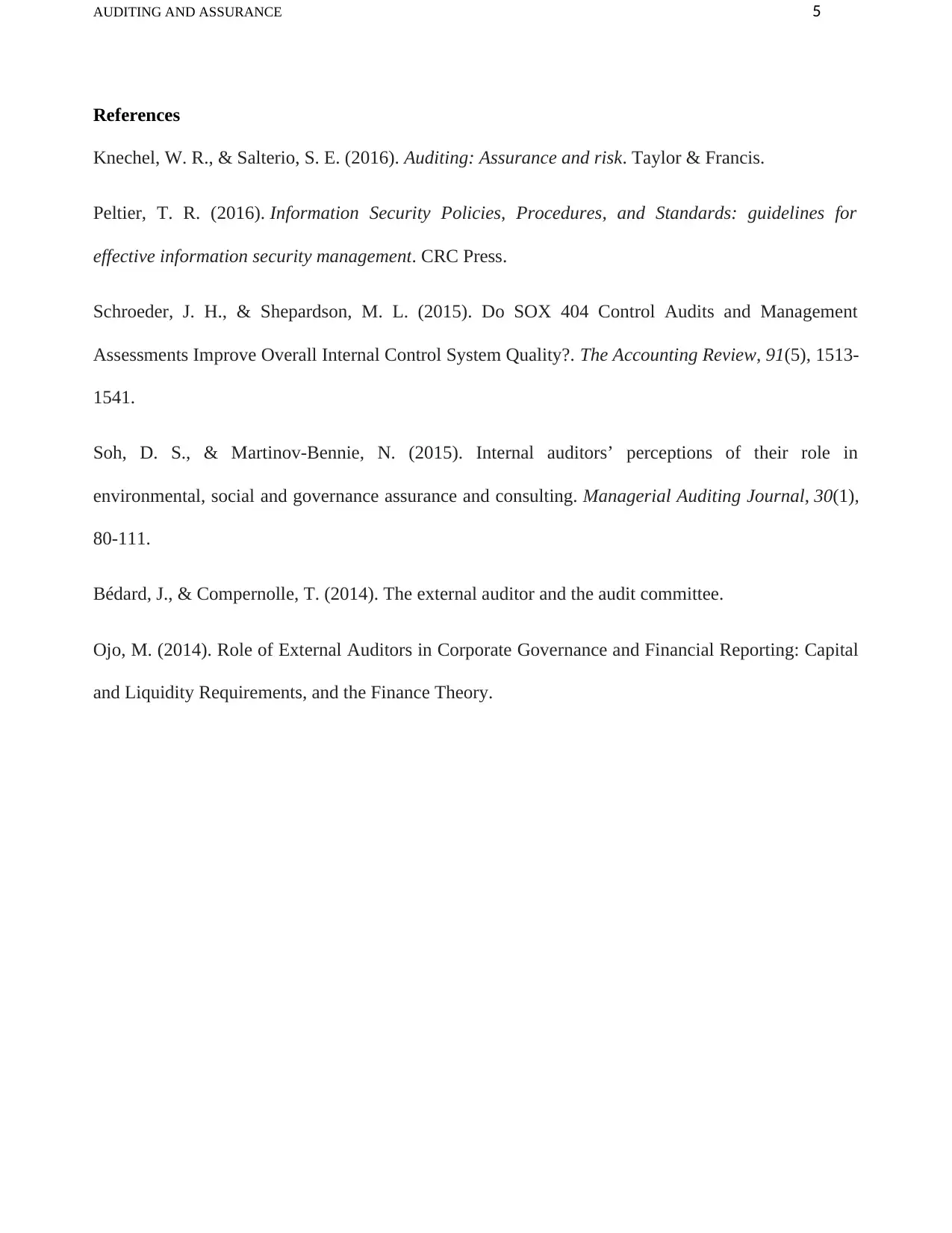
AUDITING AND ASSURANCE 5
References
Knechel, W. R., & Salterio, S. E. (2016). Auditing: Assurance and risk. Taylor & Francis.
Peltier, T. R. (2016). Information Security Policies, Procedures, and Standards: guidelines for
effective information security management. CRC Press.
Schroeder, J. H., & Shepardson, M. L. (2015). Do SOX 404 Control Audits and Management
Assessments Improve Overall Internal Control System Quality?. The Accounting Review, 91(5), 1513-
1541.
Soh, D. S., & Martinov-Bennie, N. (2015). Internal auditors’ perceptions of their role in
environmental, social and governance assurance and consulting. Managerial Auditing Journal, 30(1),
80-111.
Bédard, J., & Compernolle, T. (2014). The external auditor and the audit committee.
Ojo, M. (2014). Role of External Auditors in Corporate Governance and Financial Reporting: Capital
and Liquidity Requirements, and the Finance Theory.
References
Knechel, W. R., & Salterio, S. E. (2016). Auditing: Assurance and risk. Taylor & Francis.
Peltier, T. R. (2016). Information Security Policies, Procedures, and Standards: guidelines for
effective information security management. CRC Press.
Schroeder, J. H., & Shepardson, M. L. (2015). Do SOX 404 Control Audits and Management
Assessments Improve Overall Internal Control System Quality?. The Accounting Review, 91(5), 1513-
1541.
Soh, D. S., & Martinov-Bennie, N. (2015). Internal auditors’ perceptions of their role in
environmental, social and governance assurance and consulting. Managerial Auditing Journal, 30(1),
80-111.
Bédard, J., & Compernolle, T. (2014). The external auditor and the audit committee.
Ojo, M. (2014). Role of External Auditors in Corporate Governance and Financial Reporting: Capital
and Liquidity Requirements, and the Finance Theory.
⊘ This is a preview!⊘
Do you want full access?
Subscribe today to unlock all pages.

Trusted by 1+ million students worldwide
1 out of 6
Related Documents
Your All-in-One AI-Powered Toolkit for Academic Success.
+13062052269
info@desklib.com
Available 24*7 on WhatsApp / Email
![[object Object]](/_next/static/media/star-bottom.7253800d.svg)
Unlock your academic potential
Copyright © 2020–2026 A2Z Services. All Rights Reserved. Developed and managed by ZUCOL.





